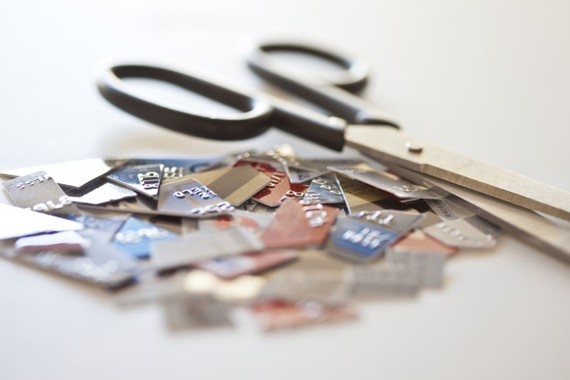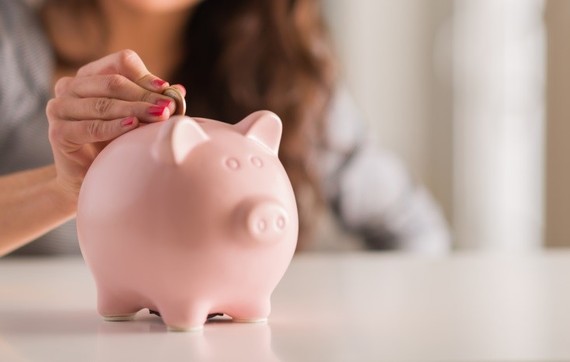Debt is the four-letter word Americans hate to hear. Today, the average American household has debts totaling around $7,200. According to Aimee Picchi on CBS Moneywatch, American household credit card debt is increasing despite the fact that average household earnings have not experienced a similar increase to account for that new debt. Why? Many Americans don't know the best way to get out of debt.
Movies and television are rife with debt-ridden individuals struggling to overcome their spending habits -- but it seems that every portrayal includes a scene with a character taking scissors to all the plastic in her wallet. It's a cathartic exercise, and the media would have you believe it's also a smart financial decision.
However, destroying your credit cards can have a negative impact on your already suffering credit score. Just as opening too many lines of credit too quickly will cause lenders to ask questions, closing your accounts all at once and avoiding credit entirely labels you an unreliable borrower.
Instead, you should work to pay off your debt logically and diligently. Here are some smart strategies to get you out of debt without further damaging your credit score.
Live Frugally
For most people, this is the most difficult aspect of overcoming debt. After living comfortably beyond your means for a few years, racking up debt with credit cards, student loans, and more, it may feel impossible to fit into a more humble lifestyle.
The transition will be uncomfortable at first, but the payoff is immense. Plus, hundreds of other debt-ridden families have overcome more debt than you by employing this strategy. Here are a handful of steps to get you started on your new frugal way of life:
•Make a budget for each paycheck rather than an entire month.
•Cut your entertainment spending in half, then cut it in half again.
•Strive to DIY whenever possible, from cooking to home repairs.
•Use energy-saving tricks to save on utility bills.
Use the Right Credit Cards
Rewards and perks shouldn't be a priority when you're trying to get out of debt. Most credit cards that offer significant benefits come at a significant cost.
It's best to find and use cards with no or low interest and high limits. Credit card comparison sites are particularly valuable for this task; for example, you can use CompareCard to search for the best balance transfer cards search to understand which card would fit your spending needs.
Pay More Than the Minimum
Each month, interest increases the amount of your debts. This means every dollar of debt will grow before your next due payment. Therefore, the faster you can pay off your debt, the less money you will waste overall.
If nothing else, you should strive to pay more than the minimum simply to decrease the amount of time you are living under debt.
For instance, if you owe $2,000 with a 14 percent APR, it will take you 14 years and more than $1,800 in interest to overcome your debt with minimum payments alone.
However, if you pay above the minimum, say $100 per payment, you can become debt-free in under two years and about $300 in interest. There are a handful of online debt calculators that can help you understand what monthly payments you can afford to become debt-free in the shortest possible time.
Take Out Another Loan
At first glance, it might seem counter-intuitive to take out another loan when credit card debt is becoming a nightmare. However, in certain cases, using a loan to pay for more expensive debts could save you time and money. Not all debts are equal. Some debts come with high interest rates and only provide depreciating assets in return. These are 'bad debts.' Other debts can help salvage your credit with more forgiving interest rates that will allow you to pay them off more quickly. These are 'good debts.'
Your bank or credit union might be willing to furnish you with an unsecured personal or signature loan that will get rid of your more pressing debts, so it's wise to check with them. Usually, the rates and payments on these loans are more manageable than credit cards. They are excellent alternatives to credit cards for anyone looking to become debt-free.
Continue Paying Other Bills
Even if you can only afford to pay the minimum, you have to commit to continue paying all your bills. Your mortgage is particularly important, especially when you're deep in debt.
The monthly mortgage payment might be your most substantial bill, but skipping it in favor of higher-interest debts will only damage your credit and put you at risk of foreclosure -- and homelessness. In this case, you may want to use small personal loans or credit cards described above to keep your other bills up to date, which means now isn't the time to take scissors to your plastic.
Live frugally, use the right cards if you still need credit, pay more than the monthly minimum, continue paying other bills, and if the situation is dire, don't be afraid to take out one more loan. Getting a grip on your debt will make you a more responsible spender in the future and give you peace of mind.



